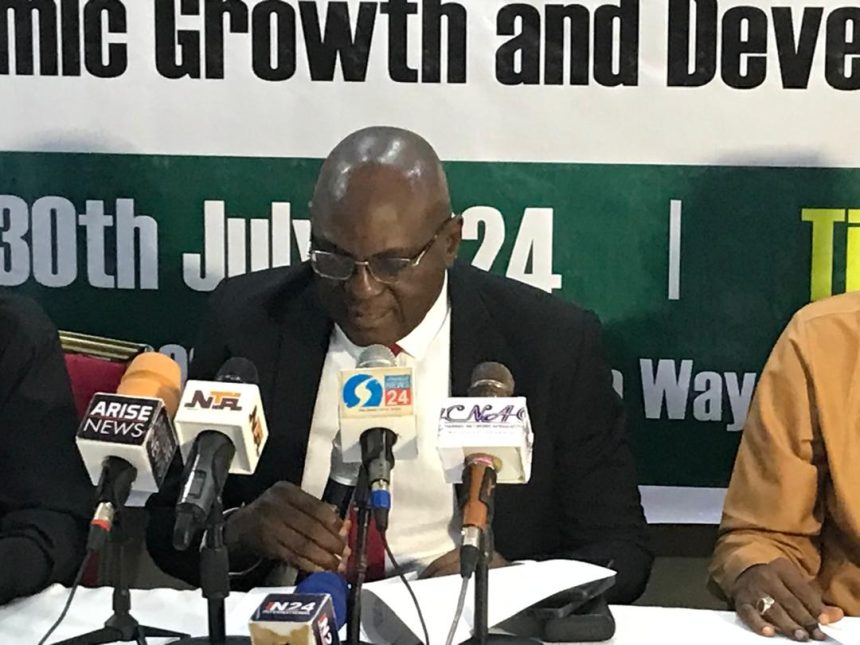With barely 48 hours to the August 1 planned nationwide protest, the Independent Media and Policy Initiative (IMPI) on Tuesday urged Nigerians to exercise patience with the President Bola Tinubu-led administration and shelve the proposed protest.
The group feared that embarking on such protest will adversely affect the progress being made by the government in the economy and other sectors.
Addressing journalists in Abuja the Chairman of IMPI, Chief Niyi Akinsiju said with patience Nigerians will witness the coming economic upsurge and prosperity.
He was accompanied to the press briefing by the group’s Vice Chairman, Mr. Mohammed Danjuma, a Public Affairs and Social commentator and media consultant, Mr. Chukwudi Enekwesi, former Director Administration of News Agency of Nigeria and Secretary of the group, Mr. Mohammed Momoh.
Others with him are former Commissioner of Information and Chief Press Secretary to former governor of Adamawa state, Dr. Ahmed Saju, former Vanguard newspaper editor and legal practitioner, Barrister Oyatomi Kunle, former Head of Northern Operation of TVC, Mr. Dapo Ogunbanjo.
IMPI Chairman said “For us, the policies being implemented are enablers of an enhanced economic drive that will ensure broader prosperity and wealth creation for all Nigerians. However, as the President had noted variously, to accomplish the envisaged era of economic growth and prosperity, therefore, there is a need for all Nigerians to commit to this vision as it evolves.
“By our own understanding, it may be slow, it may be painful, but it is certain that as a people, we will witness this upcoming period of economic upsurge and prosperity.
“Those who want to protest have the right to protest, but this must be done in the appropriate context. A protest should be anchored on substantive rationale or reasons that are achievable. Based on this, we appeal for patience so as not to disrupt the gathering momentum being built in the nation’s economic sphere that may be counterproductive.”
Even with the pains Nigerians are going through, he maintained that the policies introduced by the Tinubu’s administration has started to show capacity to address the challenges.
“We are well aware of Nigeria’s skyrocketing year-on-year inflation figure standing at 34.19% in June 2024. This figure is primarily driven by surging food prices, which culminated in higher food inflation at 40.87% in the month.
“The increase in inflation rate may have been aggravated by the depreciation of the Nigerian currency on the back of the harmonization of the foreign exchange windows and the removal of fuel subsidy by the federal government; the twin policies that now define the structural reformation of the economy.
“Without a doubt, the aggregate impact on the cost of goods and services truly reflects a disruption on the quality of life of the average Nigerian. We are, however, not unmindful of the President’s admonition at different times to the generality of Nigerians on the possible consequential impact of the reforms. We share in the President’s standpoint on this matter. No reform of the magnitude being undertaken can succeed without some forms of pain.
“It is gratifying to note that the policies have begun to show initial capacity to redress the challenges they were conceived to address. In this regard, we note the impressive reduction in the national debt profile, which had fallen in dollar terms from 108 billion to 91 billion. What is obvious is that the wasteful regime of fuel subsidy contributed in no small measure to this huge debt accumulated over the years,” he added.
Stressing that the government accomplished the debt red within a 14-month period, he said the impressive debt profile reduction” “now reflects in the hitherto worrisome debt service-to-revenue ratio, which has now dropped from 97% in the first half of 2023 to 68% in 2024.”
Continuing, Chief Akinsiju said “This is in addition to the N7.3trillion Ways and Means obligation paid back to the Central Bank of Nigeria by the federal government within a year of the Tinubu administration. Also remarkable is that the budget deficit has fallen from 6.1% to 4.4%, a clear indication of strategic fiscal management.
“The healthy fiscal environment is apparently helped by the increase in the quantum of crude oil production, from 1.28 million barrels per day in April 2024 to 1.61 million barrels per day as of July 23,2024; the first time in 42 months.
“Connected to this, is the vast improvement in the balance of the nation’s foreign reserve which increased from $32.29 billion in April 2024 to $37.05 billion in July 18, 2024.
“Remarkably, between June 30 and July 18 the external reserves rose from $34.70 billion to $37.05 billion — indicating an increase of $2.35 billion in about 18 days. This foreign reserve balance covers 11 months imports, another indication of a stabilizing economy” he stated
On the power sector, he said the group is encouraged by the quantum leap in power generation and transmission.
According to him, the sector recorded a number of interventions through policies and actions by the federal government.
“It was a remarkable feat when 700 megawatts of electricity were added to the national grid with the commissioning of the Zungeru Hydro- Electric Power Station in Niger State.
“In addition, the power sector also recorded the commissioning of two substations in Kebbi and Ajah in Lagos to consolidate the nation’s electricity distribution capacity. This has led to a considerable improvement in power supply across the country.”
IMPI also commended the President for the payment of the historical N3.3 trillion Naira debt owed the power sector, which “for years, crippled the nation’s capacity to generate, transmit and distribute the required electricity, and unfortunately subjected the populace to the agony of endless power outages.”
Chief Akinsiju stressed that IMPI is very optimistic that the national electricity supply will be further enhanced if the current initiative to transfer ownership and management of power assets to private entities succeeds under the regulatory supervision of the states, through the federal government policy to democratize ownership and operations.
The group observed that there is an evolving paradigm in the nation’s economic template, going by the recent announcement of employment opportunity for 30,000 fellows that have graduated from cohort 1 of the ongoing 3 Million Technical Talents programme under the Ministry of Communications, Innovation, and Digital Economy.
“This is indicative of an economy that is producing digital talents for both domestic and global engagement,” the Chairman said
Speaking on agriculture, the group said that it is on record that the federal government has distributed 60,452metric tons of improved seeds, 887,255metric tons of seedlings, 138 value kits, 501,726 liters of agrochemicals, 62,328.5metric tons of inorganic fertilizers, 1,000kg fungicide, and 33,200 equipment to famers across different value chains to boost agricultural production.
“This flurry of President Tinubu interventions in agriculture, has at the last count, successfully generated a total of N309bn into the economy in one year, suggesting a resurrection of exporting activities in the agriculture sector.
“On aggregate, the recent waiver of import duties and tax on food importation will make food abundantly available and affordable locally.
“Grounded on this projection is the $20billion foreign investment commitments the federal government had secured to revolutionize the agricultural sector, in the bid to ensure food security in the country, and to reinvent Nigeria’s pride of place as the agricultural giant of Africa.”
The group noted that the additional creation of the Ministry of Livestock Development may have opened a new vista in concerted efforts to advance agriculture in the country and tackle herders-farmers crisis in Nigeria.
“This initiative reveals the true intention of the President to harness Nigeria’s huge livestock potentials and to find a lasting solution to the incessant Farmers-Herders clash in the country as well as reinforce the value chain that will create more employment opportunities.”
While commending state governors who are investing in agriculture, the group urged others to join the efforts to grow food in Nigeria.
To this end, Chief Akinsiju also urged State Governors and Local Government Administrators to utilize the financial opportunity presented by the tremendous increase in their various allocations from FAAC, to support the exemplary efforts of the federal government towards massive food production.
On transportation, IMPI commended President Tinubu for the reopening of the Lagos-Kano railway line.
IMPI Chairman said “This is best appreciated within the context of the contributions of the Lagos-Kano railway line to the economic, social, political, and cultural development of Nigeria.
“The facilitation of social and cultural integration between and among various ethnic groups along the Lagos-Kano railway route was legendary and also contributed immensely to the cementing of national unity. We commend the president for the landmark achievement.”
The group applauded the Tinubu’s administration for the establishment of Nigerian Education Loan Fund (NELFUND) in the education sector, which it noted may indeed be the game changer to facilitate access to education.
“Impressively, within a short period of its establishment, applicants have started receiving credits for school fees and upkeep. This is revolutionary, and all Nigerians must applaud this.
“The federal government only few days ago, opened the portal for a reinvigorated National Youth Investment Fund (NYIF) to be administered by the Ministry of Youth Development. It was a N75bn funding initiative for young business owners which former President Muhammadu Buhari introduced in 2020 but the Tinubu administration has now expanded it by about 50% to N110bn in order to accommodate more beneficiaries among the youth demography”
IMPI also called on State Governors to wholeheartedly embrace the judgment of the Supreme Court and cooperate with the federal government in ensuring disbursement of funds.
Chief Akinsiju commended the decision of President Tinubu’s administration paving way for Dangote and other Refineries to get crude oil from NNPCL in naira.
He said “And if there are still doubts about the sincerity of the federal government to make things work, the cabinet approval of President Tinubu’s proposal to ease the operation of the single largest private sector initiative in the country should clear everything.
“The lifeline handed to Dangote and other Refineries that will see them getting crude oil from NNPCL in naira, underlines the President’s pro-business mindset at a time many people were worried about the damage the rift in the petroleum industry could inflict on Nigeria’s quest for improved Foreign Direct Investments (FDI).
“We consider this policy as not only momentous but a practical economic intervention that will go a long way to eliminate the need for international letters of credit as well as saving the country billions of dollars that may have to be committed to importing refined. This will also reflect on the pump price of petrol.
“From the foregoing, it is obvious that the policies conceived, deployed, and being implemented by the Tinubu Administration do not only appear to be functioning but also, by our estimation, are impactful.
“It shows a clear understanding of the constricted economic models that were implemented over the years, which, more or less, had limited our development and growth potentials.” he stated.
During the question and answer session, the IMPI Chairman, while noting that there is need for a substantive Minister of Humanitarian Affairs and Poverty Alleviation, said that Nigerians are not missing so much by the exit of the suspended Minister as the Ministry of Finance has tentatively taken over its functions.
Answering another question, he pointed out that no other government since 1999 has recorded the infrastructures put in place by immediate past President Muhammadu Buhari’s administration.












